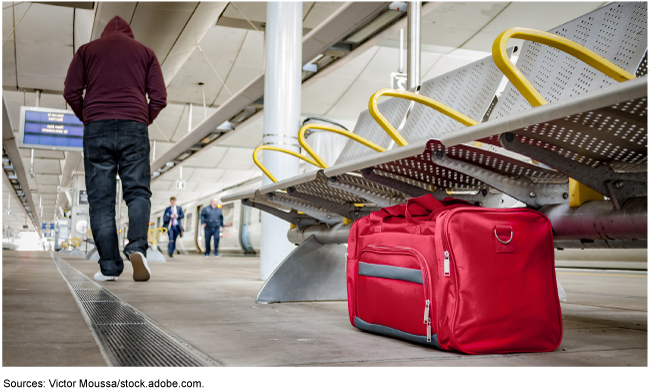Surface Transportation: TSA Implementation of Security Training Requirement
Fast Facts
Surface transportation operations—including rail and mass transit—are vulnerable to terrorism and other threats.
TSA determined that 127 surface transportation operations are at high risk because of their location or other reasons. Their owner/operators are required to develop security training programs to help employees address potential security threats, and must submit the programs for TSA's review.
As of Dec. 2021, TSA had approved 73% of the programs submitted. TSA will begin compliance inspections of each program a year after approval.
Screenshot from a training video that TSA developed for surface transportation owners and operators

Highlights
What GAO Found
In March 2020, the Transportation Security Administration (TSA) issued its final rule implementing a new requirement that security-sensitive surface transportation employees receive security training. TSA identified 127 surface transportation owner/operators that it determined to be at higher risk of being targeted or used by terrorists because, for example, they ship hazardous materials or operate in high-density urban areas. The final rule required these owner/operators to submit security training programs for TSA review by June 2021. The programs are to include information on how security-sensitive employees should prepare for, observe, assess, and respond to terrorist-related threats and other security incidents. Examples of employees who are to receive this training include those who operate vehicles, inspect or maintain vehicles, or load cargo and baggage.
Surface Transportation Modes Covered by the Transportation Security Administration’s Security Training Requirement

As of December 2021, TSA had reviewed each of the 121 submitted training programs and had approved about three-fourths (88 of 121). TSA reported that it returned 84 percent of the submitted programs to owner/operators at least once for revision. The primary reason for TSA-requested revisions was that programs did not cover all the required training topics.
Surface transportation industry associations and selected owner/operators said that TSA resources—including training videos, checklists, and webinars—were generally helpful to the development of their training programs.
Some owner/operators are now training employees, and they generally have one year from the date of TSA’s approval of their program to complete such training. TSA plans to begin inspections of each of the 127 operations once these deadlines occur. These inspections will focus on the extent to which the programs meet requirements, according to TSA officials.
Why GAO Did This Study
Surface transportation operations such as freight and passenger rail can be difficult to secure. Their open architectures are designed to move people and goods quickly and passengers are generally not subject to vetting. To address this risk, the Implementing Recommendations of the 9/11 Commission Act of 2007 (9/11 Commission Act) required that TSA develop regulations requiring security training for certain surface transportation employees.
The 9/11 Commission Act also includes a provision for GAO to review implementation of these regulations after issuance of TSA's final rule. This report describes (1) the key regulatory requirements for the security training programs; (2) TSA's process for and results from reviewing the training programs; (3) industry associations' and selected owner/operators' perspectives on the training programs; and (4) the status of training program implementation and TSA's monitoring plans.
To conduct this review, GAO analyzed TSA program guidance and other documents, and interviewed TSA officials. GAO also interviewed representatives from three surface transportation industry associations and a nongeneralizable sample of six owner/operators selected to capture variation in transportation mode, operation size, and training program status. This sample allowed GAO to learn about important aspects of the implementation of TSA's final rule, but it was not designed to provide findings representative of all the owner/operators that are required to implement this training program.
For more information, contact Tina Won Sherman at (202) 512-8461 or ShermanT@gao.gov.
